Erta Ale (Volcano Week 4)
Thursday, 30th July 2009 by RobK
It’s Volcano Week 4 here at GSS. Volcanoes, about a week. You know the drill!
Volcanoes probably aren't the first thing you associate with Ethiopia, but Erta Ale is a particularly fine specimen.
It may only be a little over 600 metres high1, but this volcano (whose name means "smoking mountain" in the local Afar language) is home to a fiery lake of lava - one of only five in the world! Little wonder that it is known locally as the "gateway to hell". Living near here seems a risky proposition - a large eruption in 2005 killed hundreds of livestock and forced villages to be evacuated, and further eruptions two years later also caused hundreds of residents to flee.
Erta Ale is located in the Afar Depression, which is very geologically active: three "rift zones" (where tectonic plates are being forced apart) meeting nearby. As well as several volcanoes, there's a multitude of hot springs and incredibly salty lakes.
Just below Erta Ale is the strikingly blue Lake Afrera, which is believed to contain at least 290 million tons of salt, but pales in comparison to Lake Assal, across the border in Djibouti. Assal is the saltiest lake on Earth2, with a salinity 10 times greater than that of the ocean.
The region has another red-hot claim to fame. Even away from the boiling lava, it is said to be the hottest place on Earth, in terms of yearly average temperature. The mining community of Dallol (near the volcano of the same name) recorded a mind-boggling average temperature of 34°C between 1960 and 1966, although today it is a ghost town.
The BBC website has an interesting article on the challenges of surveying Erta Ale, including a video of one of the scientist abseiling into the crater. There's more about the volcano at Wikipedia.
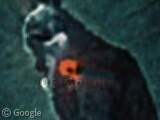
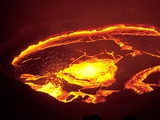
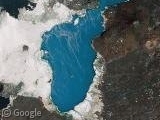
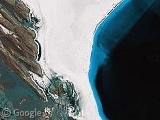

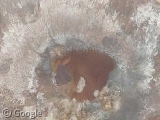

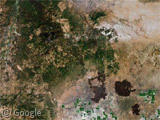
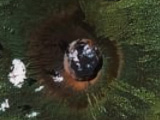
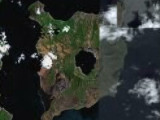
Completely off topic but I think the google plane is photgrphing IPSWICH today (31st July 2009). I was in my garden with a white t-shirt on so maybe I will be on google earth one day, YAY!